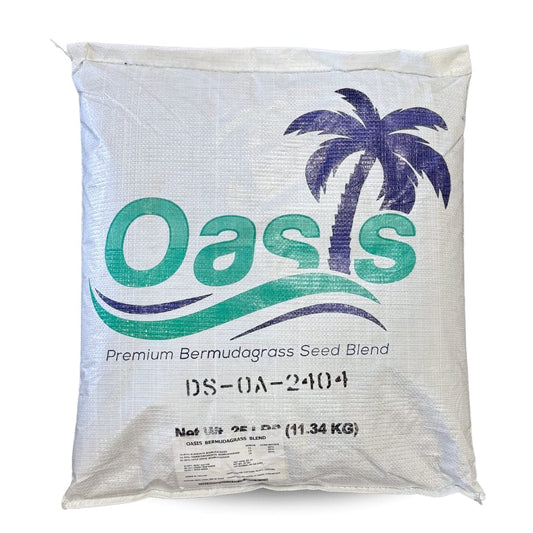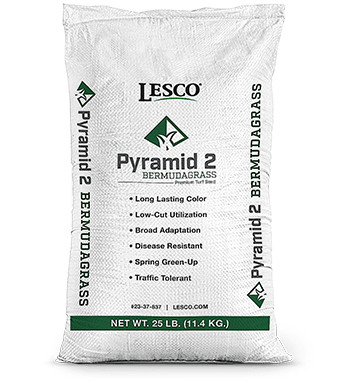Bermuda Grass Seed
Bermuda grass seed bred for dense growth, durability, and a thick, green lawn in warm-season climates.
3 products
-
 Sold out
Sold outSouthern Charm Bermuda Grass Seed
Regular price $99.00Regular priceUnit price per -
Bermuda Grass Seed - Improved 3-way Blend
Regular price $189.99Regular priceUnit price per -
LESCO Pyramid 2 Bermuda Grass Seed (Coated) 25 lb.
Regular price $257.99Regular priceUnit price per
Looking for Bermuda grass seed to achieve a beautiful, dense, and durable lawn? You've come to the right place. Whether you're wondering where to buy Bermuda grass seed or searching for a Bermuda grass seed and fertilizer kit, we offer everything you need to establish and maintain a stunning Bermuda lawn.
Bermuda grass is a warm-season favorite, prized for its ability to grow in sunny areas with excellent drought tolerance. Here's everything you need to know about selecting, planting, and caring for Bermuda grass seed:
1. Choosing the Right Bermuda Grass Seed
- Opt for pure Bermuda grass seed if you're seeking the highest quality lawn.
- Seed blends with fertilizer are ideal for a quick start and convenience.
2. How Much Bermuda Grass Seed Do You Need?
- For new lawns, sow 1–2 lbs of seed per 1,000 sq. ft.
- For overseeding, use 0.5–1 lb per 1,000 sq. ft.
This ensures even coverage and the thick, carpet-like appearance Bermuda grass is known for.
3. When to Seed Bermuda Grass
- Plant Bermuda grass seed in late spring to early summer when soil temperatures reach 65–70°F or higher. This promotes optimal germination and establishment.
- For warm climates, this can extend into early summer. Avoid seeding during fall or winter as Bermuda grass thrives in warmer conditions.
4. Watering Bermuda Grass Seed
- Keep the soil consistently moist during germination. Water lightly 2–3 times per day to avoid drying out the seeds.
- Once the grass begins to sprout (usually within 7–14 days), reduce watering to 1–2 deep sessions per week to encourage strong root growth.
5. Fertilizing Bermuda Grass
- Apply a starter fertilizer when planting, such as 15-20-10 to provide essential nutrients.
- Once established, Bermuda grass benefits from 4–5 lbs of nitrogen per 1,000 sq. ft. annually. Use a slow-release fertilizer for consistent feeding such as our 20-0-10 Fertilizer.
6. Bermuda Grass Seed Costs
- The cost of Bermuda grass seed varies depending on purity and blend, averaging $7–$13 per lb.
- For convenience, explore our Bermuda grass seed bundle that combines premium seeds with starter fertilizer.
7. Buying Bermuda Grass Seed
- Unsure where to buy Bermuda grass seed? We’ve got you covered with fast shipping and high-quality products tailored to your needs. Whether you're starting from scratch or overseeding, we have the perfect solution.






